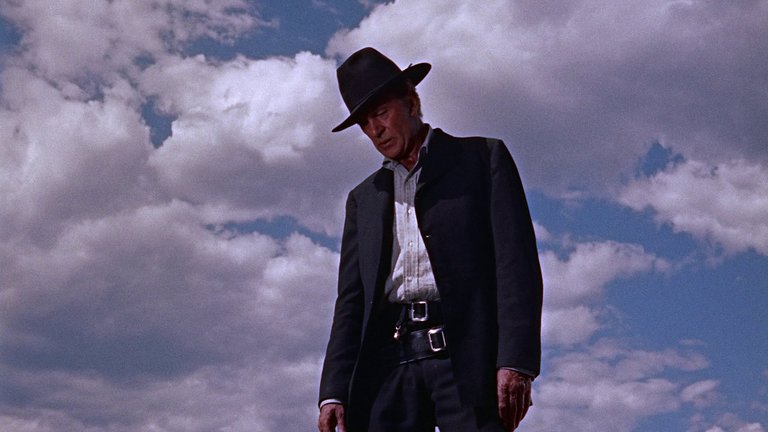Film Review: The Hanging Tree (1959)

If one is to watch a high-quality Hollywood western that represents the golden age of the genre, a good choice would be The Hanging Tree, a 1959 film directed by Delmer Daves. Based on the eponymous 1957 novelette by Dorothy M. Johnson, the author known for providing literary sources for other prominent westerns like The Man Who Shot Liberty Valance and Man Called Horse, this film is set in 1873 Montana.
The plot begins with Joseph Frail (played by Gary Cooper), a physician and part-time gambler, arriving in the small mining town of Skull Creek to provide medical services to the locals. The place is lawless, and miners, when wronged, like to take matters into their own hands. Young man called Rune (played by Jim Piazza) learns this the hard way when he gets shot after being caught stealing gold from the sluice box. Frail, after saving his life, hires him as an unpaid servant and assistant. Later, Frail treats Elizabeth Mahler (played by Maria Schell), the daughter of a Swiss immigrant and survivor of a fatal stagecoach robbery. As he slowly nurses her to health, Frail has to deal with both his emerging feelings towards the beautiful patient and the rumours her presence in his house creates among the townsfolk. The biggest problem, however, is "Frenchy" Plante (played by Karl Malden), the miner who originally found her during the search and who has become obsessed with her, not hiding his intentions to have his way with her, even if it requires violence.
The Hanging Tree is not considered a grand classic, although it has all the ingredients a good western should have. This includes the colour cinematography by Ted McCord, the spectacular widescreen vistas of forest locations in Washington State, and the music soundtrack by the always dependable Max Steiner, complemented by the title song performed by Marty Robbins, which is quite catchy and was nominated for an Oscar.
What makes The Hanging Tree interesting is that the script takes an approach towards the Wild West that is unusually dark for 1950s Hollywood and is almost revisionist in nature. The Wild West is described as violent and unpleasant, a place where people are ruled by their basest instincts, which include greed and lust. This includes even the protagonist, Gary Cooper, one of the most iconic actors in the history of the genre, who shines in his last western role. The character of Frail is unusually dark, both literally (having dark clothes and hat) and not fitting into the neat Good Guy vs. Bad Guy classification. He is capable of good deeds but is also a cynic who exploits the young man he saved, a gambler very handy with a gun and quite capable of violence, with a dark reputation that actually precedes him in the small mining town of the West. What is even more interesting is that, like so many people in the Old West, he came there less in search of wealth and adventure and more in order to escape his dark past.
Cooper's great performance is well-matched by Karl Malden, who plays a character that would surprise audience accustomed to western clichés. Frenchy, with his lack of manners and outrageous clothes, looks bufoonish and almost serves as comic relief, yet that same character, led by greed and palpable and uncontrollable lust, slowly and inevitably transforms into a monstrous villain.
Cooper's and Malden's performances easily outshine the rest of the cast, which includes Maria Schell, a talented Austro-Swiss actress who, on the account of her relatively "exotic" looks, is reduced to something of an eye candy, despite some attempts to give the character of Elizabeth bits of proto-feminism. Young Ben Piazza is solid but rather unremarkable in the role of Frail's assistant, who, by the film's end, serves as something of a moral anchor. Both of those actors pale in comparison with George C. Scott in his first credited screen role, although his talent is underused because the character of the alcoholic faith healer Grubb is underused.
"The Hanging Tree" has a very good and effective ending that can serve as some sort of social commentary and might remind Cooper's fans of the finale of High Noon. Yet, this also creates inevitable comparisons with the 1952 classic that make the 1959 film look slightly overlong and below its proper potential.
Despite all those flaws, The Hanging Tree is still a very good western that could be recommended even to those viewers who aren't among the most dedicated fans of the genre.
RATING: 7/10 (+++)
Blog in Croatian https://draxblog.com
Blog in English https://draxreview.wordpress.com/
InLeo blog https://inleo.io/@drax.leo
Hiveonboard: https://hiveonboard.com?ref=drax
Rising Star game: https://www.risingstargame.com?referrer=drax
1Inch: https://1inch.exchange/#/r/0x83823d8CCB74F828148258BB4457642124b1328e
BTC donations: 1EWxiMiP6iiG9rger3NuUSd6HByaxQWafG
ETH donations: 0xB305F144323b99e6f8b1d66f5D7DE78B498C32A7
BCH donations: qpvxw0jax79lhmvlgcldkzpqanf03r9cjv8y6gtmk9
Posted Using InLeo Alpha
!MEME
Credit: tanzil2024
Earn Crypto for your Memes @ HiveMe.me!